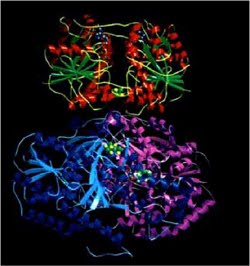A UCLA study reported in
ScienceDaily has overturned the traditional view of the evolution of the human brain.
'Scientists usually describe evolution in terms of the human brain growing bigger and adding new regions,' explained the principal investigator, Dr. Daniel Geschwind, the Gordon and Virginia MacDonald Distinguished Professor of Human Genetics and a professor of neurology at the David Geffen School of Medicine at UCLA. 'Our research suggests that it's not only size, but the rising complexity within brain centers, that led humans to evolve into their own species.'
Using post-mortem brain tissue, Geschwind and his colleagues applied next-generation sequencing and other modern methods to study gene activity in humans, chimpanzees and rhesus macaques, a common ancestor for both chimpanzee and humans that allowed the researchers to see where changes emerged between humans and chimpanzees. They zeroed in on three brain regions -- the frontal cortex, hippocampus and striatum.
By tracking gene expression, the process by which genes manufacture the amino acids that make up cellular proteins, the scientists were able to search the genomes for regions where the DNA diverged between the species. What they saw surprised them.
'When we looked at gene expression in the frontal lobe, we saw a striking increase in molecular complexity in the human brain,' said Geschwind, who is also a professor of psychiatry at the Semel Institute for Neuroscience and Behavior at UCLA.
'Although all three species share a frontal cortex, our analysis shows that how the human brain regulates molecules and switches genes on and off unfolds in a richer, more elaborate fashion,' explained first author Genevieve Konopka, a former postdoctoral researcher in Geschwind's lab who is now the Jon Heighten Scholar in Autism Research at University of Texas Southwestern Medical Centre.


